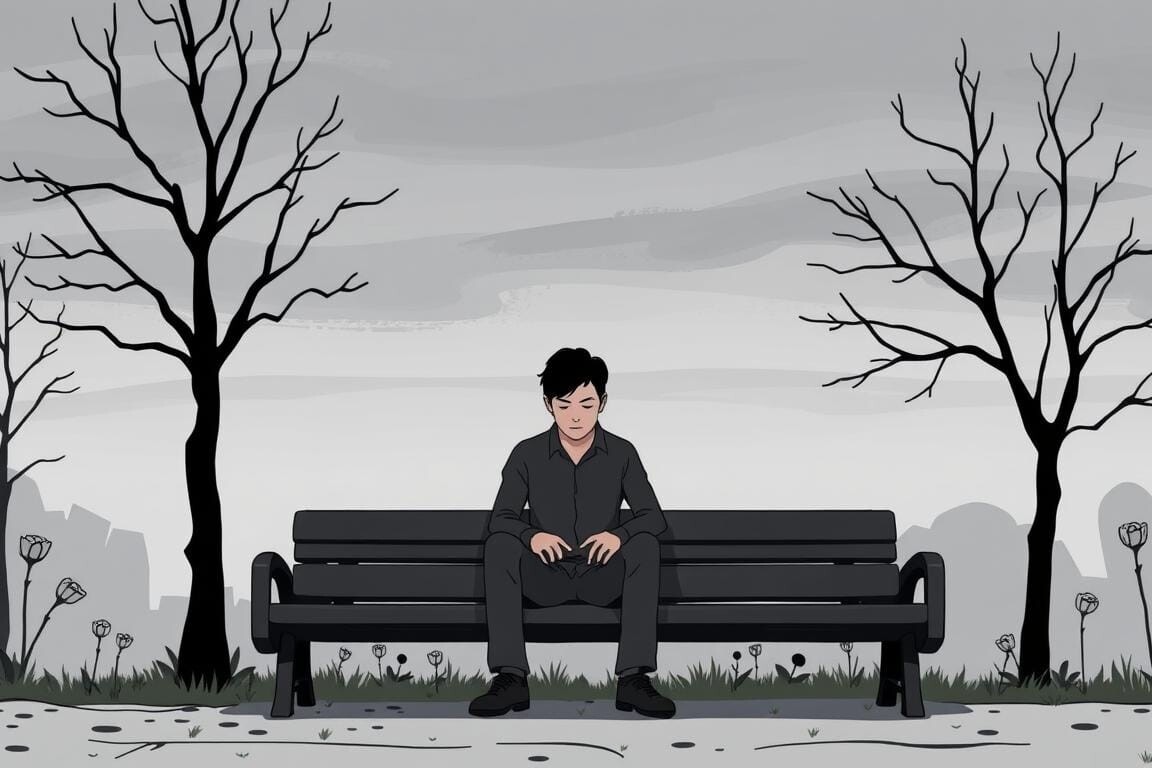Finding the right therapy for depression is a big step. Dr. Chandril Chugh is here to help. He guides you through treatments that can change your life for the better.
Depression is a tough condition that affects many areas of life. It can make daily tasks hard, hurt relationships, and lower your quality of life. Dr. Chugh shows you evidence-based treatments that can help.
There are many treatments for depression. This includes medicines that fix brain imbalances and psychotherapy that changes your mind. Dr. Chugh’s insights help you make smart choices and find your way to recovery.
If you’re feeling sad, tired, or worthless, this guide is for you. It gives you the tools to beat depression and get your life back. Let’s find the best therapy for depression together and start your journey to wellness.
Table of Contents
ToggleUnderstanding Depression: A Silent Battle
Depression is a complex mental health issue. It deeply affects a person’s life. It’s not just feeling sad for a while. It’s a long-lasting feeling of sadness and hopelessness.
Depression shows up in many ways. It can change how you think, feel, and even your body.
Symptoms and Manifestations of Depression
Depression symptoms vary from person to person. Some common signs include:
- Persistent feelings of sadness, emptiness, or hopelessness
- Loss of interest or pleasure in activities once enjoyed
- Changes in sleep patterns, such as insomnia or excessive sleeping
- Significant weight loss or gain, with changes in appetite
- Difficulty concentrating, making decisions, or remembering things
- Feelings of worthlessness or excessive guilt
- Recurrent thoughts of death or suicide
These symptoms can make daily life hard. It’s tough to work, socialize, or even take care of yourself.
Prevalence of Depression: A Growing Concern
Depression is a big problem worldwide. The World Health Organization says it’s the top cause of disability. Over 300 million people suffer from depression globally.
In the United States, about 15 million adults have depression. The number of people with depression is growing. Diet, lifestyle, and environment play a role.
It’s important to know about depression. It shows how crucial it is to get help and find effective treatments. This can help fight depression and improve mental health.
The Importance of Seeking Professional Treatment
When dealing with depression, getting professional help is key. Depression is a complex issue that needs a team effort. This team includes doctors, therapists, and friends.
By talking to mental health experts, you get a correct diagnosis. You also find the best ways to treat it.
Research shows that therapy like CBT and interpersonal therapy is very helpful. These therapies help you understand and deal with depression. They also teach you how to feel better mentally and emotionally.
For severe depression, you might need both medicine and therapy. Medicine can help with symptoms. Therapy works on the deeper issues.
Finding the right therapist is important. You might need to try a few before you find the right one. Remember, asking for help is brave and can really help you get better.

Don’t let shame stop you from getting help. Depression can be treated, and with the right support, you can take back your life. Start by talking to a doctor or therapist today.
Medication Options for Treating Depression
Medication is key in managing depression. It helps bring relief and balance back. There are many antidepressant types, each with its own benefits. Knowing these can help find the right fit for you.
Antidepressant Categories and Their Mechanisms
Antidepressants are grouped by how they work in the brain. You have SSRIs, SNRIs, Tricyclics, Atypicals, and MAOIs. Each targets different brain chemicals to fight depression.
Finding the Right Medication: A Personalized Approach
Finding the right depression medication is all about you. What works for one might not work for another. Your doctor will look at your history and symptoms to choose the best option.
It might take some trying to find the right fit. But remember, medication is just part of the plan. Your doctor might also suggest therapy and lifestyle changes to help you feel better.
Psychotherapeutic Interventions: Beyond Medication
Medication is not the only way to treat depression. There are other methods that can help too. Cognitive Behavioral Therapy (CBT) is one of them. It helps people change their thinking and feel better.
Cognitive Behavioral Therapy (CBT): Reshaping Thought Patterns
CBT is a type of therapy that helps people change their negative thoughts. It teaches them new ways to think and act. This way, they can fight off depression.
Research shows CBT works well for depression. Adults usually get 20-24 sessions of therapy. Interpersonal Psychotherapy (IPT) also helps, focusing on relationships. Adults get 16 to 20 sessions on average.
CBT helps people understand their thoughts better. It teaches them how to manage their symptoms. This method is great for keeping depression away and improving life.
Lifestyle Modifications for Managing Depression
Simple changes in your lifestyle can help manage depression. These include exercise, light therapy, and nutrition. They are powerful tools for better mental health.
Exercise as an Antidepressant
Regular exercise is a proven way to fight depression. Just 30 minutes a day, 3 to 5 times a week, can help. It reduces stress, boosts mood, and improves sleep.
Walking, swimming, or cycling are great options. They offer many benefits.
Light Therapy for Seasonal Affective Disorder
Light therapy is a big help for those with seasonal affective disorder (SAD). It involves sitting in bright light for 30 minutes a day. This can ease winter depression symptoms.
Nutrition and Sleep: Essential Components
Eating well and sleeping right are key to managing depression. Foods rich in omega-3s, magnesium, and vitamins B and C help your mood. A good bedtime routine and regular sleep schedule also help.
By making these lifestyle changes, you can manage your depression better. Small steps can lead to big improvements in your mental health.

Mindfulness and Self-Care: Embracing Inner Strength
Mindfulness and self-care are key in fighting depression. They help you take charge of your recovery. By using meditation and deep breathing, you learn to know yourself better and control your feelings. Self-care activities like exercise and spending time with friends also help manage depression.
Mindfulness is about being in the moment. It helps you see your thoughts and feelings clearly. Adding mindfulness to your day, like meditation or journaling, helps you grow.
Self-care is also crucial for beating depression. It covers your body, mind, and heart. Self-care for depression means getting enough sleep, eating well, and exercising. It also means doing things you love and getting support from others.
By focusing on mindfulness for depression and self-care, you build inner strength. This way of dealing with depression can greatly improve your mental health and life quality.
Your path to wellness is your own. Finding the right mix of therapies and self-care is important. Mindfulness and self-care can open the door to a happier, more balanced life.
Building a Support System: Overcoming Isolation
Depression can make you feel alone, which makes it worse. But, having a strong support system can help. It can make you feel connected and part of a community.
One in six American adults deals with mental health issues, says the U.S. National Institute of Mental Health. A good support system can lead to better well-being and longer, healthier lives. It helps reduce depression, anxiety, and stress, which are key in getting better.
Being around people who support you can help you feel more connected. They encourage you to eat well and exercise. They also help distract you from negative thoughts.
Getting help from professionals in your support system is also important. The World Health Organization (WHO) says social isolation can make depression worse. It’s a big problem worldwide, causing 15% of all cases.
- Build a support network of family, friends, and trusted communities.
- Participate in support groups or join online communities to connect with others facing similar challenges.
- Seek out referrals from healthcare providers or mental health professionals to access additional resources and support.
- Engage in activities that promote social interaction and a sense of belonging, such as volunteering or joining a club.
By building a strong support system, you can beat depression’s feeling of isolation. You’ll get the help and connections you need to feel better.

best therapy for depression: Cognitive Behavioral Therapy (CBT)
Cognitive Behavioral Therapy (CBT) is a top choice for treating depression. It’s a proven method that helps people change negative thoughts and behaviors. These changes can help fight depression.
The Cognitive Model: Understanding Thought Patterns
The cognitive model was created by Aaron Beck. It shows how thoughts shape our feelings and actions. CBT therapists help clients spot and change these negative thoughts.
By replacing bad thoughts with better ones, people can feel happier and more well.
Exposure Therapy: Confronting Social Fears
Exposure therapy is a key part of CBT for depression. It helps people face their fears in a safe way. This way, they learn to handle their anxiety better.
It’s especially helpful for those who feel isolated or afraid to be around others.
Mindfulness: A Powerful Tool for Self-Awareness
Mindfulness is also used in CBT. It helps people notice their thoughts and feelings without judgment. This can be very helpful for those with depression.
It lets them deal with their experiences more kindly and flexibly.
CBT combines the cognitive model, exposure therapy, and mindfulness. This makes it a very effective treatment for depression. It helps people feel more in control, happier, and live more fulfilling lives.
The Effectiveness of CBT for Treating Depression
Cognitive Behavioral Therapy (CBT) is a top choice for treating depression. It has shown to greatly help people feel better and live better lives. It also helps them stay strong over time.
Research shows CBT works as well as medicines for some types of depression. People who try CBT might be 50% less likely to get depressed again soon. Plus, the good effects of CBT last long after therapy ends.
CBT changes how people think and act. It helps them fight negative thoughts and find better ways to cope. This approach, lasting 10-20 sessions, has been proven many times by experts.
It’s important to work with a skilled therapist for CBT to work. They should have a master’s or doctoral degree in clinical psychology or counseling. They know a lot about depression and how to help you feel better.

In short, CBT is a proven way to treat depression. It helps people face their problems and find ways to deal with them. This makes CBT a lasting solution for those fighting depression.
Integrating Multiple Approaches for Optimal Results
Managing depression is not a one-size-fits-all job. The best way is to mix different methods. This includes medication, therapy, lifestyle changes, and support. Together, they make a plan that works best for you.
Studies show that mixing medicine and therapy works better than one alone. About two-thirds of people with major depression get better with one treatment. But, mixing treatments can help more people get better and stay that way.
People with long-term depression, past trauma, or other mental health issues benefit most. This mix tackles the many causes of depression. It helps manage symptoms and stop them from coming back. Plus, adding therapy can lower the chance of depression coming back.
It’s important to work with your doctor to make a plan that fits you. This might include medication, therapy, mindfulness, lifestyle changes, and. This way, you can take charge of your mental health and start a journey to recovery.
Conclusion
Remember, you’re not alone in your fight against depression. This article has shown how complex it is and why getting help is key. You can try different treatments like medicine, therapy, or a holistic approach to feel better.
Be open-minded and patient when trying different therapies. What works for one person might not work for you. Every step towards caring for yourself is a victory.
Keep your loved ones close and do things that make you happy. Don’t be afraid to ask for help from professionals. With the right mindset and support, you can beat depression and take back your life. Start your journey to wellness today.
FAQ
What are the symptoms and manifestations of depression?
Depression makes you feel hopeless and sad. You might lose interest in things you used to like. It can also mess with your sleep and appetite, and make it hard to focus.
How prevalent is depression, and why is it a growing concern?
Depression is a big problem that affects many people. It’s important to raise awareness and find good treatments.
Why is it crucial to seek professional treatment for depression?
Getting help from a professional is key. They can give you the right treatment. This can really help you feel better.
What are the different categories of antidepressants and their mechanisms of action?
There are many types of antidepressants. Each works in a different way. Finding the right one is a personal thing.
How effective is Cognitive Behavioral Therapy (CBT) in treating depression?
CBT is very effective. It helps change negative thoughts and feelings. This can really help you feel better.
What are the benefits of lifestyle modifications in managing depression?
Making healthy lifestyle changes can help. Things like exercise, light therapy, and eating well can improve your mood.
How can mindfulness and self-care practices empower individuals in their recovery from depression?
Mindfulness and self-care are powerful tools. They help you find joy and deal with hard feelings. This can help you feel more hopeful.
Why is building a strong support system crucial for individuals struggling with depression?
Having people you can count on is very important. It helps you feel connected and supported. This is key to getting better.
How does the cognitive model of Cognitive Behavioral Therapy (CBT) help individuals with depression?
The cognitive model of CBT focuses on thoughts and feelings. It uses techniques like exposure therapy. This helps you face fears and understand yourself better.
What is the evidence supporting the effectiveness of Cognitive Behavioral Therapy (CBT) in treating depression?
Lots of studies show CBT works well. It improves symptoms and quality of life. It also helps you stay strong over time.
Why is it important to integrate multiple approaches for optimal results in managing depression?
Using different methods together is best. This includes medicine, therapy, lifestyle changes, and support. It helps manage depression’s many aspects and helps you take back control.
Source Links
About The Author

This article is medically reviewed by Dr. Chandril Chugh, Board-Certified Neurologist, providing expert insights and reliable health information.
Dr. Chandril Chugh is a U.S.-trained neurologist with over a decade of experience. Known for his compassionate care, he specializes in treating neurological conditions such as migraines, epilepsy, and Parkinson’s disease. Dr. Chugh is highly regarded for his patient-centered approach and dedication to providing personalized care.
→ Book a consultation to discover which remedies suit your needs best.




